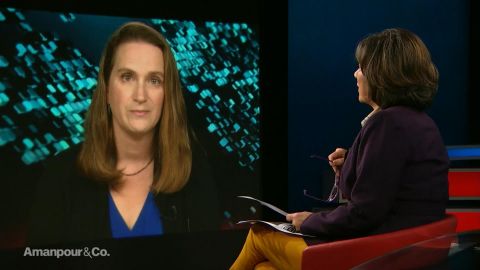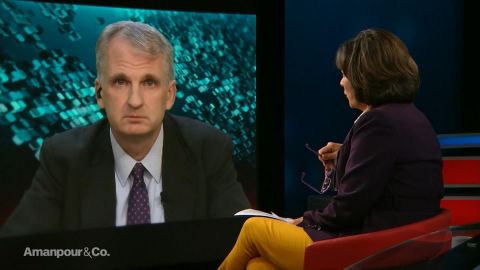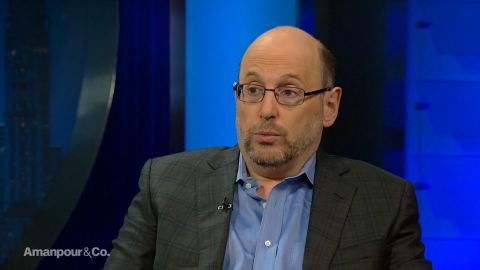Read Transcript EXPAND
CHRISTIANE AMANPOUR: Journalist and author Kurt Eichenwald was diagnosed with epilepsy when he was in college. His new book A mind unraveled recounts his battle against the brain disorder from discrimination and medical incompetence to being sexually abused after a seizure. He told our Hari Sreenivasan that he’s considering drastic remedies now.
HARI SREENIVASAN: Set this up for us. How did you find out that you had epilepsy?
KURT EICHENWALD, AUTHOR, A MIND UNRAVELED: That was in my first year of college. What’s interesting is I had symptoms as far back as I could remember but I didn’t know what they were. I would have these staring spells where I would basically disconnect from everything that was happening and come back and be dazed and have trouble understanding where I was or, you know, having, you know, been peeling at my shirt for some reason which apparently is common but I didn’t understand what it was. I was in denial about it. Then when I was in college, I had a night where I woke up on the ground next to my bed. I had been asleep. I hadn’t just fallen out of bed, something had happened, and I could tell something had happened. I was not completely coherent. I was having trouble getting off the floor. I had injured my hand. And it’s hard to explain a post-seizure, what it feels like. It’s called Postictal. You know as a description, a seizure is like the brain catching fire. Everything is going off at once. All the neurons are firing. And the body has — the brain has inhibitors, chemicals that, you know, put the fire out but it also puts out everything. And so when your brain is full of inhibitors, it is very hard to reconnect. It is very hard to speak. It is very hard to do a lot of things. But after I woke up on the ground next to the bed, I called home and I said something’s wrong. And the next day, I called home and said something’s wrong, I need to see a doctor. And then came my first meeting with a neurologist and I got diagnosed that day.
SREENIVASAN: Tell us how severe this was. You described passages where you’re having very very frequent seizures and your friends are left to pick up the pieces.
EICHENWALD: My roommates in college, Karl Moore and Franz Pasha were amazing. When the seizures got worse and worse, I was having convulsions four or five times a week. I was having what I call these drop attacks which are far worse. I mean people won’t necessarily understand this where you’d drop like a ton of bricks without warning but you don’t lose consciousness. And so–
SREENIVASAN: So you’re walking down the street and you collapse?
EICHENWALD: Yes. This is instantaneous. All the muscles release and you drop. And the problem with that is you’re standing next to a piece of glass, you’re walking down the stairs, you’re, you know, anything. Look around your life and think at any second I could hit anything. I hit a pot of boiling water and burn this part of my arm and it was terrifying. And when I got that sick, it was very very difficult for my roommates because it had escalated to the point where the doctors didn’t know what they were doing. I hadn’t found the doctor who saved me yet and they were dealing with all of this and they were in their 20’s.
SREENIVASAN: You had several stories about doctors who [13:45:00] not only misdiagnosed you but misprescribed medications that really drove you almost inches away from death if you had continued following their advice. How did you tolerate and deal with the trauma just from that idea that these are the people, these are the experts, these are the people who are supposed to help you get better and yet for varying reasons they were doing the opposite?
EICHENWALD: I knew particularly the first doctor was doing a terrible job. I mean my seizures were escalating. And it was when I met the doctor who saved me, Dr. Alan Naarden where I learned how a neurologist is supposed to be. I kind of challenged him. I’ve been told twice, “We’ll stop the seizures” and I knew that wasn’t right by then. And so when he said, “Oh, we’ll do this and this”, I just snarkily said, “And then the seizures will stop, right?” And his response changed everything. He said, “I don’t know.” And he said, “But we will keep working to get the best control you can get with the lowest side effects.”
SREENIVASAN: You wrote a recent article but you also wrote eloquently in the book about how you’re essentially a walking billboard for pre-existing conditions, that your employers, your early employers, this was the crucial factor in whether and where you were going to work.
EICHENWALD: That’s the thing when people talk about the whole pre-existing condition issue, they seem to have no understanding of what it means. You know, we have a system of private insurance. OK, whatever you think of that, that’s what we have. If you then turn around and say, “Well, if you’re not perfectly healthy when you’re signing up for insurance, you don’t get private insurance.” I’m a fortunate person. I grew up with a family, you know, my father was a doctor. We had means. I was college-educated. But if I had no insurance, I would be bankrupt overnight.
SREENIVASAN: Are you concerned that these protections are going to get stripped away whether it’s on a state by state basis or nationally?
EICHENWALD: It’s impossible not to be terrified by that. The biggest reason to be terrified by that is, you know, there are people who are relentlessly trying to tear down the ACA while simultaneously saying, “We’re committed to keeping people with pre-existing conditions covered.” Well, what are their answers? The same things we were doing when I couldn’t get insurance. You know, these things didn’t work and telling people like me next time they will. They won’t. If the attempt to tear down the pre-existing conditions clauses goes through, my wife and I have decided for her to retire and for us not to have the risk. We’re going to have to leave the United States. And we’re already looking at getting citizenship elsewhere because we have to.
SREENIVASAN: You’ve been a writer for a long time. You’ve tackled big, messy subjects. How was this experience different?
EICHENWALD: It’s a lot different to write about yourself than to write about, you know, other people’s experiences. I mean I revealed basically my entire life. I mean when my agent heard about this, his first response was, “Why didn’t you ever tell me?” Because people did not know.
SREENIVASAN: What were the fears of you stepping up and saying that?
EICHENWALD: Well, the fears when I was younger was not being able to have a job, not being able to stay in school. And I revealed it and eight weeks later, I was thrown out of school. And when I had a job, within hours of them finding out I had epilepsy, and this was on my first day of work, I lost my job. And so you get sort of drilled into you. Be afraid you don’t know how people will react.
SREENIVASAN: You also described kind of the worst case scenario where you wake up once and really it’s doctors at a hospital telling you that — and bringing to light that you might have been raped.
EICHENWALD: That — obviously, that’s a little difficult to talk about. [13:50:00] I woke up and I was bleeding and the bleeding was bad. And I went to the hospital, had been some time after a seizure. I didn’t remember anything. Well, I remembered — I can’t explain it, a McDonald’s sign, a bridge, something blue that was metal, somebody putting me in a car. And I ended up at the hospital and that’s — that, you know, they were inspecting what was causing the bleeding. And that’s when I was told that I had been raped.
SREENIVASAN: You talked publicly about the rape incident in the context of the Kavanaugh hearings recently. Why was this so difficult to report it then? Right. What was the — what was stopping you at the time?
EICHENWALD: I could have reported it. I wanted it gone. I didn’t want to think about it. I didn’t want to deal with it. And so even though people in the hospital were urging me to call the police, the emotional torment that was going on, I had to get away from it. I couldn’t face the fact that I was that vulnerable, post-seizure. I knew it intellectually but emotionally, I didn’t want to deal with it. So when I sat there seeing all these people who have never gone through this kind of experience, using this Sherlock Holmes analysis of how people react to being sexually assaulted, there’s a reason why I understand. I’ve been through it. And most of these people, perhaps all of these people who think it’s so simple, who think that “Oh, why didn’t she tell anybody right away?” have no idea what they’re talking about. Is what Dr. Ford is reporting the truth? I don’t know. Based on my experience and based on how I saw her behave when she talked about it, do I believe her? Absolutely. And those who don’t, those who make fun of her, those who have the simplistic ideas of what sexual assault victims go through, I pray they never experience this kind of harm. But I know that if they do, they’ll be ashamed of themselves because then they will understand.
SREENIVASAN: One of the things that I admire is your resiliency through all this. But what is it that kept you going? What has the disease taught you?
EICHENWALD: That we only have one life. That if we get ourselves wrapped up in the negative aspects of our life, that we’re just throwing time away. Everything has to have a purpose. And if you’re always pursuing that purpose, whatever it may be, life is intensely rewarding. I didn’t want to lose that and I could have lost that. And there were times when I was not — I felt I was reaching the end that I couldn’t fight the fight anymore. And yes, I did contemplate suicide. I had constant traumatic experiences. And in the end, it gave me strength. And that’s really the message of the book, that confronting trauma can give you strength. You can only become a victim to the extent that you allow yourself.
SREENIVASAN: Kurt Eichenwald, thanks so much for joining us.
EICHENWALD: Thank you
About This Episode EXPAND
Christiane Amanpour speaks with Professor of History Timothy Snyder, President of Planned Parenthood Leana Wen and forensic pathologist Judy Melinek. Hari Sreenivasan speaks with journalist and author Kurt Eichenwald.
LEARN MORE



